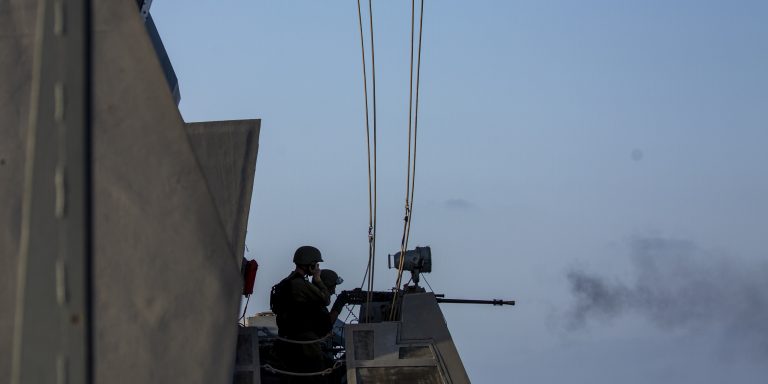INTELBRIEF
March 30, 2021
IntelBrief: Fighting in the Shadows: Israel and Iran

Bottom Line up Front
- Israel and Iran are engaged in an undeclared, low-level war involving attacks on ships, facilities and proxy groups
- Israeli leaders might be seeking to derail efforts by the Biden administration to rejoin the 2015 multilateral Iran nuclear deal.
- The conflict could escalate as Iran continues to expand its nuclear activities in violation of the 2015 multilateral Iran nuclear agreement the US left.
- The U.S. and other powers could potentially be drawn into the conflict as their commercial and national security interests become affected.
A series of recent incidents involving Israeli and Iranian ships and Iranian and Iran-backed persons and facilities suggest that Iran and Israel are engaged in low-level and undeclared warfare. Neither government has claimed responsibility for or commented publicly on these attacks. Since the May 2018 Trump administration exit from the multilateral Iran nuclear agreement (JCPOA), Israel reportedly has been responsible for an explosion at an Iranian centrifuge assembly plant (July 2020) and the killing in Iran of the architect of Iran’s nuclear weapons research program, Mohsen Fakhrizadeh (November 2020). A series of incidents in February and March this year - explosions aboard Iranian oil tankers in the Mediterranean en route to Syria, a purportedly deliberate oil leak off Israel’s coast, and two suspected Iranian attacks on Israeli-owned commercial ships in the Persian Gulf and the Arabian Sea - suggest that the cycle of attacks is accelerating and the target sets are expanding. The maritime incidents come amid a backdrop of several hundred Israeli air strikes on Iranian military installations in Syria over the course of the past five years. Israel has sought to thwart the Iranian infrastructure in Syria through which Iran has attempted to translate its intervention on behalf of Syrian President Bashar Al Assad to a broader strategic advantage against Israel.
The expansion of the Israel-Iranian conflict to commercial entities suggests that both countries might not shrink from further escalation. Among many different options, Iran might increase the frequency of its attacks on Israeli owned installations and potentially back another round of terrorist attacks on Israeli diplomats and citizens around the world, as happened during 2012-2013. Israel’s leadership considers Iran’s nuclear program as an existential threat and Israeli defense and political leaders have repeatedly threatened to strike Iran’s nuclear facilities if Iran appeared on the verge of developing an actual nuclear weapon. Iran’s increasing violations of the 2015 nuclear deal – which Tehran claims are “reversible” responses to comprehensive U.S. sanctions on Iran – could potentially trigger more aggressive Israeli offensive strikes. Even without such a major assault, Israel’s attacks on Iranian shipping in 2021 could represent an effort to derail the Biden administration’s stated intent to rejoin the agreement. Israeli Prime Minister Binyamin Netanyahustaunchly opposed the JCPOA as insufficiently restrictive on Iran’s nuclear capabilities, and he opposes the Biden administration’s plan to return to the deal without demanding major additional Iranian concessions.
Any escalation of Iran-Israel conflict has the potential to draw in regional and other powers, most notably the United States. Experts have long postulated that Israel lacks the capability to destroy Iran’s nuclear facilities, and would be intended instead to embroil the United States in follow-on strikes designed to cripple even the most hardened nuclear installations. Most experts believe that the United States would have to periodically strike rebuilt or reconstituted Iranian facilities for the indefinite future. In this scenario, the Biden administration’s plans for diplomacy with Iran could evolve into a protracted U.S.-Iran conflict of nearly infinite scope and duration, and likely expanding outside the Middle East region. Any U.S. intent to refocus its national security strategy for great power competition would almost certainly yield to a renewed U.S. concentration on securing its interests in the Middle East.
Both Russia and China could also be drawn into an escalating conflict between Iran and Israel. Russia is already aligned with Iran in backing the regime of Bashar Al Assad of Syria and there is potential for Russia to try to protect Iranian oil shipments to Syria from further Israeli attacks. The deliveries represent an economic lifeline for the Assad government, which remains largely isolated from global reconstruction funding. China remains a major purchaser of oil from Iran as well as from other Gulf states, and any significant threat to those supplies could prompt China to undertake naval and other security operations there to try to tamp down conflict. Neither Russia nor China is a security partner of the United States, presenting the potential for Russian and/or Chinese involvement in Iran-Israel conflict to put those powers at odds with the likely U.S. responses in the region. Now that an Iran-Israel conflict appears to be taking firmer shape, it is difficult to forecast with certainty what directions it will take and what steps, if any, can de-escalate the tensions.